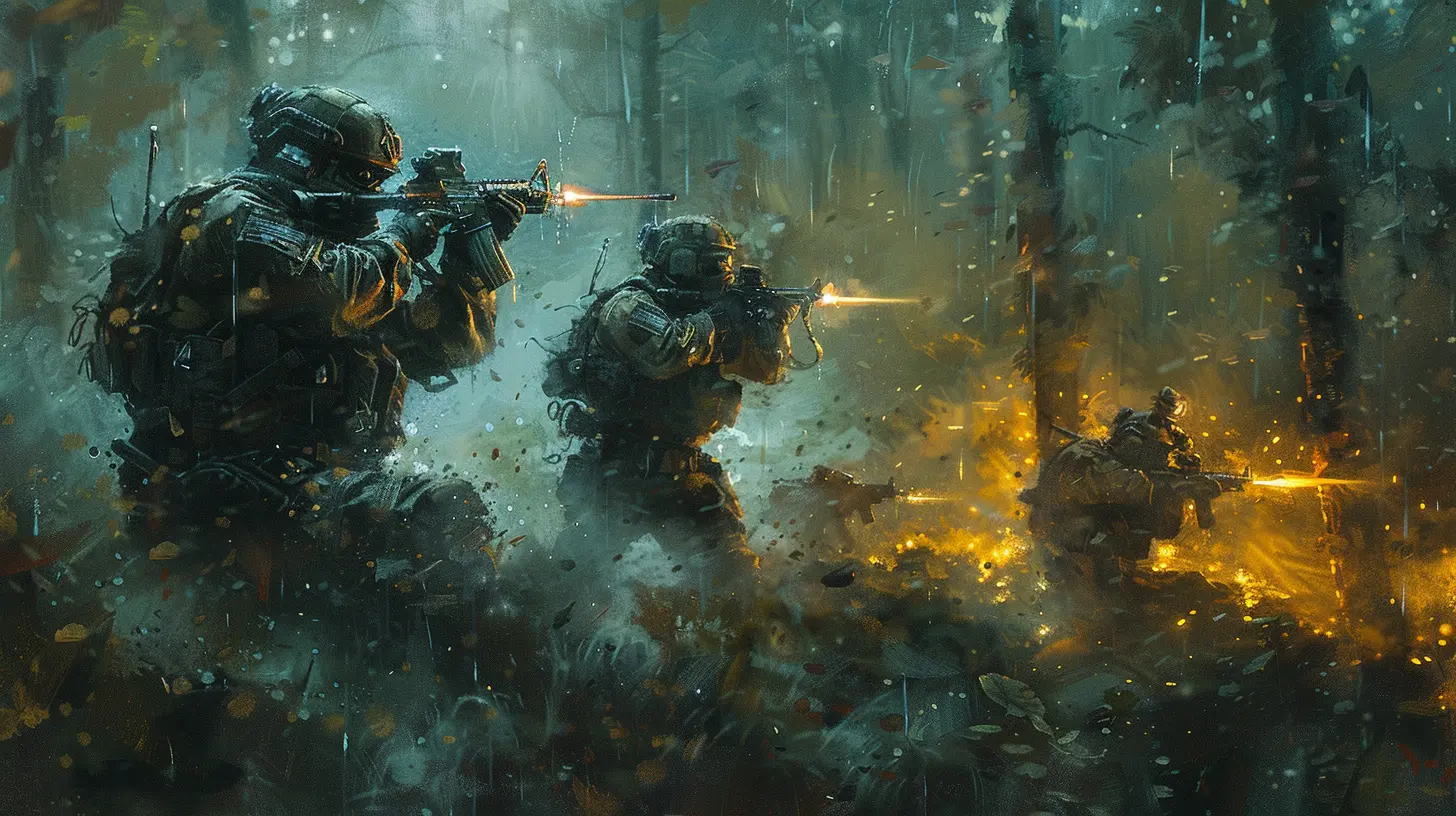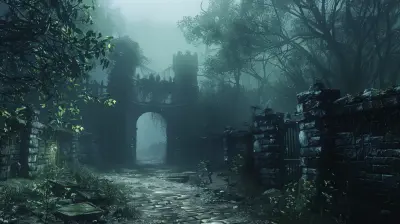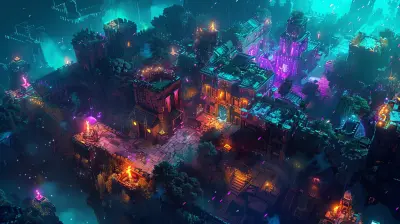Exploring the Rise of Futuristic War in Video Games
14 May 2025
In recent years, video games have taken us to places we could only dream of. From wandering through vast medieval landscapes to surviving post-apocalyptic wastelands, the industry has continuously pushed the boundaries of our imagination. But there’s one genre that has been truly skyrocketing in popularity – futuristic war. You know what I'm talking about: the laser guns, the sleek exosuits, the high-tech drones, and those jaw-dropping battles in cyberpunk cities or even outer space. It’s like watching a sci-fi movie unfold, only this time, you’re in control.
But what's fueling this rise in futuristic war games? Why are gamers so drawn to this genre? Let’s dive into the nitty-gritty of it all.
The Allure of the Future: Why Futuristic War Appeals to Gamers
First off, let’s just admit that futuristic settings are cool. Who doesn’t love the idea of piloting a mech while dodging plasma grenades or hacking into enemy systems with a flick of their wrist? It’s a far cry from the muskets and swords of historical games or the grounded realism of modern warfare. But there’s more to this fascination than just shiny gadgets and neon-lit battle zones.Escapism on a Whole New Level
Video games have always been the perfect escape, but futuristic war titles take it up a notch. They transport us to worlds where technology knows no bounds. It’s not just about fighting battles – it’s about imagining what humanity could become. These games let you live in a reality where intergalactic travel, AI soldiers, and mind-bending weapons are the norm. Sounds epic, right?Creativity Unleashed
Futuristic games let developers run wild with ideas. They’re not bound by the constraints of history or the realism required in modern military games. Want a gun that shoots black holes? Sure, why not? Need a battlefield set on a spaceship orbiting a decaying star? Go for it. The creativity in this genre is off the charts, and gamers can’t get enough of it.
The Evolution of Futuristic War in Video Games
The concept of futuristic war in gaming isn’t new, but boy, has it evolved. Let’s take a walk down memory lane to see how far we’ve come.Early Beginnings: The Spark of Sci-Fi Conflicts
Back in the day, futuristic war games leaned heavily on pixelated graphics and limited mechanics. Titles like Space Invaders and Asteroids gave players just a tiny taste of intergalactic conflict. They were simple but still managed to capture the essence of futuristic war – space battles, laser weapons, and an otherworldly vibe.The FPS Revolution: Enter the Big Guns
Fast forward to the late '90s and early 2000s, and we saw the birth of iconic franchises like Halo and Quake. These games brought futuristic combat to life in a way we’d never seen before. Halo’s Master Chief became an instant legend, fighting against alien forces with high-tech weaponry and AI companions. These games didn’t just introduce killer gameplay – they also told gripping stories about humanity’s struggle for survival in the distant future.The Present: It’s All About Immersion
Today, futuristic war games are all about immersing players in their worlds. Developers use cutting-edge tech like ray tracing, dynamic AI, and VR to make you feel like you're actually battling robots on Mars. Games like Call of Duty: Infinite Warfare, Titanfall 2, and Cyberpunk 2077 have pushed the envelope in terms of both gameplay and storytelling. The graphics are jaw-dropping, the soundtracks are cinematic, and the narratives are so compelling that you can’t help but lose yourself in them.
Core Themes Driving Futuristic War Games
So, what’s the secret sauce that makes these games resonate with players? It all boils down to a handful of core themes that seem to pop up over and over again.1. The Dystopian Factor
Let’s face it – we love a good dystopia. There’s something eerily fascinating about worlds on the brink of collapse or societies overrun by corruption and technology. Futuristic war games often explore these settings, giving players the chance to fight for hope in seemingly hopeless worlds. Think Deus Ex or The Outer Worlds – they’re not just battles; they’re moral playgrounds.2. Emerging Tech and Weaponry
A huge draw of these games is the arsenal they put in your hands. Forget regular rifles or grenade launchers; these games give you particle cannons, plasma rifles, and even tech-driven abilities like cloaking or wall-running. It’s like being a kid in a candy store, except the candy is a hyper-advanced loadout.3. Complex Ethics of War and AI
As AI becomes more prominent in our real-world discussions, it’s no surprise that futuristic war games are tackling these themes head-on. Games often explore the question: “What happens when machines take over the battlefield?” Titles like Detroit: Become Human blur the line between man and machine, forcing players to question their own morality.
Multiplayer Mayhem and the Competitive Scene
Another reason futuristic war games are thriving is their explosive popularity in multiplayer and eSports. Games like Apex Legends and Overwatch have made futuristic warfare insanely competitive and social. The futuristic elements – like unique hero abilities or advanced traversal systems – add depth to the gameplay, making matches more fast-paced and unpredictable.Plus, the sci-fi aesthetic gives these games a unique flair that stands out in the crowded multiplayer game market. Whether you’re ziplining across a map or blasting enemies with energy weapons, every match feels like a cinematic experience.
The Future of Futuristic War Games
Now, you might be wondering: What’s next? We've already got intergalactic space battles, AI soldiers, and cyberpunk dystopias. Where do we go from here?Enhanced Virtual Reality
One word: immersion. With VR technology advancing rapidly, we can expect futuristic war games to feel even more real. Imagine strapping on a headset and stepping into a battlefield where every sound, every explosion, and every interaction feels lifelike. It’s not sci-fi anymore – it’s sci-real.Procedural Worlds and Infinite Possibilities
Developers are also toying with the idea of procedural generation to create vast, ever-evolving battlefields. Think of a world where no two missions are the same, and the environment changes based on your decisions. Intriguing, right?Deeper Storytelling
While gameplay mechanics will continue to evolve, expect developers to double down on storytelling too. The line between movies and games is becoming increasingly blurred, and futuristic war titles are at the forefront of this shift. We could soon see narratives so complex and engaging that they rival the best sci-fi novels or films.Why Now Is the Best Time to Jump In
It’s clear that futuristic war games are here to stay, and there’s never been a better time to give them a shot. Whether you’re a long-time gamer or someone who’s curious about the genre, the variety is staggering. From fast-paced shooters to narratively rich RPGs, there’s something for everyone. You just have to find your battlefield.So, grab your exosuit, load up your plasma rifle, and dive headfirst into the future. Trust me – it’s a wild ride you don’t want to miss.
all images in this post were generated using AI tools
Category:
War GamesAuthor:

Leif Coleman
Discussion
rate this article
4 comments
Avery Hughes
Great article! The exploration of futuristic warfare in video games offers a fascinating glimpse into both technological possibilities and societal implications. I appreciate how you highlighted key titles that have shaped this genre. Keep up the good work!
May 23, 2025 at 5:06 AM

Leif Coleman
Thank you for your kind words! I'm glad you enjoyed the article and found the exploration of the genre insightful. Your support means a lot!
Caelestis Jordan
This article brilliantly captures the evolution of futuristic warfare in video games. It highlights how technology and narrative intertwine to create immersive experiences. From advanced weaponry to complex AI, the genre continues to push boundaries, reflecting societal fears and aspirations. Excited to see where this trend leads next!
May 22, 2025 at 4:55 AM

Leif Coleman
Thank you for your insightful comment! I'm glad you found the article engaging and that it resonated with your thoughts on the evolution of warfare in gaming. Exciting times lie ahead!
Emmeline Webster
Fascinating topic! The evolution of futuristic warfare in games not only reflects technological advancements but also our societal anxieties. I'm curious about how these narratives shape our perceptions of conflict and innovation. Looking forward to exploring the themes in upcoming titles!
May 19, 2025 at 5:12 PM

Leif Coleman
Thank you! I agree—these narratives indeed mirror our fears and hopes about technology and conflict. I’m excited to see how future titles continue to evolve this theme!
Reid McCool
Embrace innovation in gaming; the future of warfare inspires creativity!
May 15, 2025 at 4:45 AM

Leif Coleman
Thank you! The intersection of warfare and gaming truly sparks new creative possibilities, pushing the boundaries of storytelling and gameplay.



